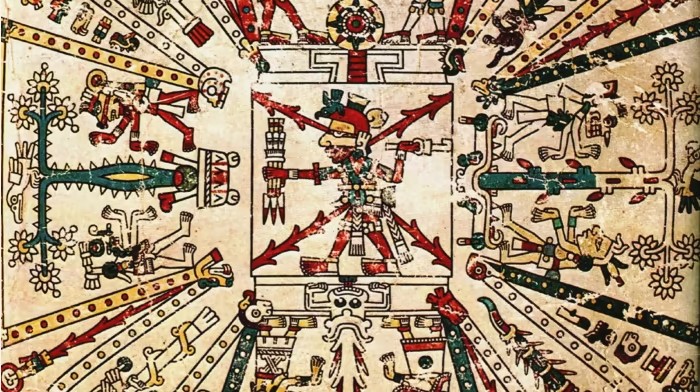‘Behind Hunt’s ambitiously constructed reality, Red Smoking Mirror is essentially a straight-up novel of intrigue, full of shadowy secrets, cloak-and-dagger politics and intimate betrayals.‘
Jonathan McAloon’s review of Red Smoking Mirror in the Financial Times gets to the heart of the novel and engages with what it attempts to do: not offer a utopian vision but rather the ‘dark, half-obscured reflection of reality’ suggested by the title itself…
In 2019, in his picaresque novel Civilisations, the French author Laurent Binet imagined a history where South and Central Americans “discover” Europe. After setting sail for early-modern Spain, the Incas take over the Old World in relative peace; in fact improve it with agrarian reforms and religious tolerance laws. But it isn’t long before warlike Aztecs follow with different ideas. Even the most utopian counterfactuals tend to right themselves eventually.
The travel writer Nick Hunt’s debut novel contributes to what we might call a multiverse of alternative colonial timelines in fiction. Red Smoking Mirror is set in 1521 — in reality, three decades after Isabella of Castile and Ferdinand of Aragón invaded and rechristianised al-Andalus.
But in Hunt’s alternative timeline, this pivotal event never occurs. Instead, the Jewish merchant Eli Ben Abram has led a fleet from Islamic Spain to the “New Maghreb”, and made his way inland to Mexico. Back in Córdoba, meanwhile, a religiously tolerant caliphate flourishes, enriched by peaceful trade with the Aztecs, here called the Mexica.
European incomers have settled in the “Moorish Quarter” of the great capital Tenochtitlan (Mexico City); as an ambassador of sorts, Eli has brokered a careful political balance. But subsequent waves of Muslim settlers question the corrupting influence of intoxicating luxuries such as tobacco flowing back across the Atlantic. They’re also suspicious of Eli and his wife Malinala, a once enslaved local who acts as a translator for Emperor Moctezuma. Now there is talk that Benmessaoud, a charismatic warrior deemed too fanatical for the caliphate, is bound for the New Maghreb.
Eli is an inquisitive, tolerant man who translates Mexica religious texts into Arabic, and calls Mexico “home” and “my miracle”. Lords dressed in feathered cloaks, kids carrying bowls of blood to temple, ritually mutilated priests “full of holes” and wearing human skins: these seem no stranger to him than more familiar rituals.
“Tenochtitlan, I sometimes think, is what [Córdoba] yearns to be,” he says. It’s not impossible that this sort of person might have first landed in the Americas instead of Christopher Columbus, and left a different European legacy — an idea that has literal implications for the book’s plot, when Columbus himself appears.
Behind Hunt’s ambitiously constructed reality, Red Smoking Mirror is essentially a straight-up novel of intrigue, full of shadowy secrets, cloak-and-dagger politics and intimate betrayals. Who is plotting against the city? Against Eli himself?
Yet I couldn’t help feeling that the thriller element, though riveting, diminished potential in other areas. We hear that Malinala goes on clandestine adventures, yet we don’t see them. Instead, she remains mysterious to Eli in order to create dark zones in the plot, a decision Hunt pays for in terms of character depth.
Despite the pluralism of the historical al-Andalus, where members of three monotheistic religions coexisted in relative peace for centuries, it’s a stretch to assume its explorers would coexist with polytheists any better than Catholics did. But that’s precisely the author’s point. The “smoking mirror” of Hunt’s title is the name of a looking glass made from obsidian that the real-life Mexica used for divination; it offers a dark, half-obscured reflection of reality.
Hunt’s New Maghreb isn’t a utopian what-if that points the way to a perfect future — it’s a simple reordering of events. As can be the case with tricksy fictional counterhistories, real history is only a step behind.


